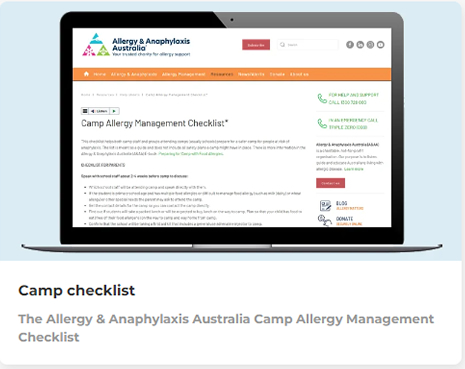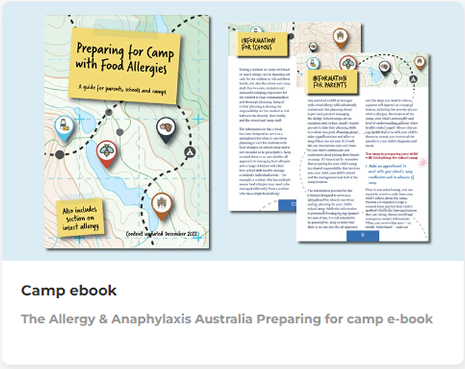Going on camp can be exciting but also a bit worrying if you have a food allergy. There are things you and your parents can do to get ready for camp to help avoid having an allergic reaction.
Top Tips for school aged campers
-
Ask your parents to contact the camp organisers and camp site to talk about food allergy management.
-
Don’t risk sharing food with others — always take plenty of your own snacks.
-
Only eat food that has been prepared by your parents or the camp cook that you, your parent or teachers have spoken with about your food allergies.
If you are not sure about a food, it is ok to double check with the cook, or to not eat it. You can have one of your snacks instead.
-
Take at least two adrenaline injectors (EpiPen®s or Anapen®s) with you. If you have asthma, take your asthma puffer/s with you too.
For more information see Allergy 250K website
Camping with a food allergy
-
School and youth camps are a great opportunity to get away with friends and try new things away from your parents.
-
It is okay to feel a little anxious about camp. Remember, the school and camp staff will be doing their best to look out for you.
-
Be sure you speak up and ask about the ingredients of the food if you are not sure.
-
Always have your medication on hand and tell someone if you feel unwell.
-
If you and your parents plan ahead and communicate with school and camp staff, the risk of a reaction is reduced.
-
The discussion your parents have with the school and campsite, will make sure that good processes are in place to manage your food allergies so that you can join in and have some fun with your friends.
Some things your parents can do
- Make an appointment to meet with the camp coordinator well before the camp. At this meeting, they should talk about how to manage your food allergy.
- Check that there is an emergency response plan for this camp.
-
Some questions your parents might ask include:
-
Have all the camp staff done anaphylaxis training?
-
Where will your emergency medication be kept?
-
Who is doing the camp catering and can you have their phone number? Contact them at least two weeks before the camp.
-
Do any of the camp activities, like games or rewards, involve food? Ask for there to be no food rewards of camp activities using food.
-
What are the rules about campers bringing snacks on camp? If campers are allowed to bring snacks, ask the camp if it is possible that no foods are allowed to be eaten in the dorms. Also ask if it is ok for you to bring snacks in case you can’t eat the food that is provided.
-
Will teachers or camp coordinators be supervising meal times?
-
-
Ask camp operators about who will be providing and supervising meals and activities.
-
Talk to the camp cook in charge of catering.
-
Ask for a copy of the menu, and how they cater for food allergy.
-
Ask if the staff that cook, prepare and serve food completed All about Allergens for Camps online training? This should include checking whether kitchen staff have knowledge of food allergy, reading labels and cross contamination and whether a meal specifically prepared for you will be provided.
-
Ask what processes they have in place to make sure campers with food allergies are given appropriate meals.
-
Some things you can do
-
Help your parents prepare a medical kit for camp. Take at least two adrenaline injectors, a copy of your ASCIA Action Plan, and any other medications including antihistamines or asthma puffers.
-
If it is a school camp, ask the teachers how the adrenaline injectors will be carried on camp – will you carry them yourself or will the teacher in your camp group carry them?
-
Talk with your parents or carers about any worries you have.
-
Take plenty of appropriate snacks for yourself that you can share with others who do not have food allergy. If you have milk (dairy), soy or wheat free bread, consider taking a loaf of the bread you usually eat, with you.
-
Do not eat any snacks that your friends bring on camp — only eat the ones you have brought yourself.
-
Read labels of any pre-packaged foods — don’t take any risks with foods that say they “may contain” your allergen.
-
Make sure you get the right meal. Always tell the catering staff about your food allergy every time you eat.
-
If you are not sure about the food, ask about the ingredients.
-
Do not share someone else’s meal or ask for a “regular” meal instead of your allergen-free meal. If you are still hungry after eating your meal, speak with camp staff, do not be tempted to eat someone’s left overs.
-
If you have symptoms of an allergic reaction, tell someone you are feeling unwell and get an adult to help straight away. Lay down on the ground. Tell them that you are having an allergic reaction. Follow the instructions on your ASCIA Action Plan.
Allergy & Anaphylaxis Australia has a free preparing for camp e-book to help you and your parents get ready for camp.
Content created May 2024


